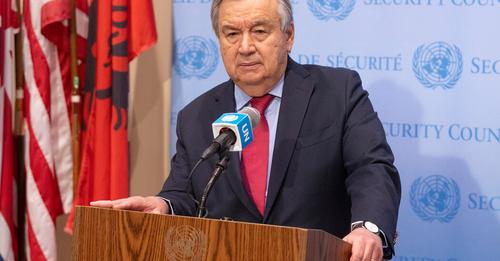World
UNFSS2023: UN Secretary-General pushes for major investment in food systems

António Guterres, Secretary-General of the United Nations, has urged for immediate action and major investment in food systems that are sustainable, equitable, healthy, and resilient.
Guterres made the announcement on Monday during the opening ceremony of the ongoing UN Food Systems Summit+2 Stocktaking Moment (UNFSS+2) in Rome, Italy.
The inaugural event, which was virtually broadcast by the News Agency of Nigeria (NAN), was attended by Ethiopian Prime Minister Abiy Ahmed, Bangladeshi Prime Minister Sheikh Hasina, and Armenian President Vahagn Khachaturyan, among others.
According to NAN, UNFSS+2, a follow-up to the 2021 UNFSS, is taking place from July 24 to 26, and aims to establish a conducive space for countries to review progress on commitments to action and identify accomplishments, difficulties, and priorities for closing the implementation gap for food systems transformation.
Guterres stated that deprived food systems meant deprived people, and that chronic hunger was increasing in regions with the weakest and most underfunded food systems, such as Western Asia, the Caribbean, and all regions of Africa.
He asked governments to react to the call for a Sustainable Development Goals (SDG) stimulus of at least $500 billion per year to increase affordable long-term finance for all countries in need.
This, he claims, will assist countries in making substantial progress towards SDG two, achieving zero hunger, and developing mechanisms to guarantee people have access to inexpensive nutritious foods wherever they live.
“We also require increased investments in resilient food, health, water, sanitation, and agricultural systems that can withstand early warning systems.”
Also see Trump’s damage management after supporters storm Capitol Hill.
“I call on governments to support the food import facility proposed by the global crisis response group on food, energy, and finance in order to expand food accessibility for at least 50 countries facing acute food insecurity.”
Guterres also charged governments and corporations with collaborating to establish systems that prioritise people over money.
He urged governments in the food, agriculture, transportation, and retail industries to look at new ways to reduce the cost and geographical availability of fresh, healthy food for all people.
He stated that this entailed keeping food markets open, reducing trade barriers and export limitations, and employing science and technology to increase food system efficiency.
Food system change, in his opinion, is critical to decreasing carbon emissions and keeping global warming to 1.5 degrees Celsius.
According to him, transformation necessitates the development of new sustainable food systems capable of reducing the carbon footprint of food processing, packaging, and transportation.
“It entails leveraging new technologies to reduce unsustainable land, water, and other resource use in the food production and agriculture sectors.”
“Transforming food systems necessitates the participation of all hands on deck.”
“Let’s keep pushing for change together.” Let us improve food systems for the future so that everyone in every community and country has access to the safe and nutritious foods they require and deserve.”
Giorgia Meloni, Italy’s Prime Minister, stated in her introductory remarks that food security has long been one of her country’s strategic principles and a priority area of Italian development cooperation.
Meloni observed that only large-scale financing could bring about dramatic changes in food systems.
“Collaboration with all international financial institutions is critical for the implementation of additional agri-feedstock projects.”
“Food security is critical in ensuring development and economic growth, as well as providing people with the opportunity to live in their own land.”
According to QU Dongyu, Director-General of the Food and Agriculture Organisation of the United Nations (FAO), the UN food systems summit process demonstrated that agri-food systems have enormous strength and potential to contribute to the accomplishment of the SDGs.
While there are still many issues, he believes that progress has been made in identifying the solution that agri-food systems can provide for improved production, nutrition, the environment, and a better living to ensure that no one is left behind.
This answer, he says, is dependent on making global agri-food systems more efficient, inclusive, resilient, and sustainable.
“In the face of increasing uncertainty and multiple crises, we must undertake this transformation urgently in order to meet the high expectations we have of our agrifood systems.”
He stated that the world needs to use cross-cutting accelerators to expedite progress, and that FAO was focused on four important areas.
He cited science and innovation, greater data capabilities, increased targeted and coordinated public and private investment, and the establishment of inclusive agri-food system governance structures as examples of these sectors.
“We can only unlock the full potential of agri-food systems if we focus on these accelerators to help minimise trade-offs and maximise synergies,” he said. (NAN)
